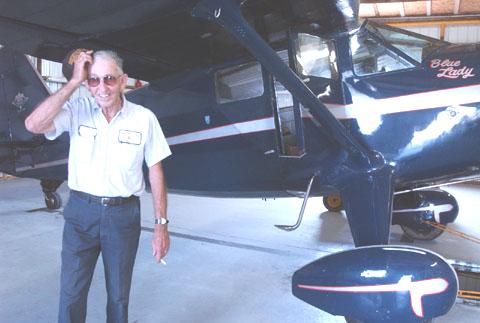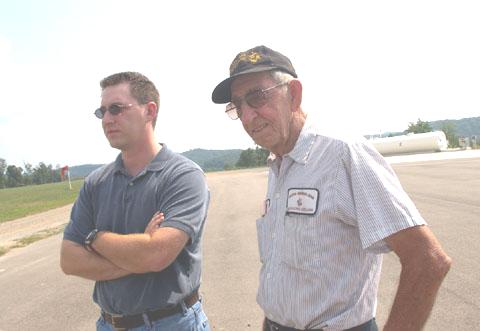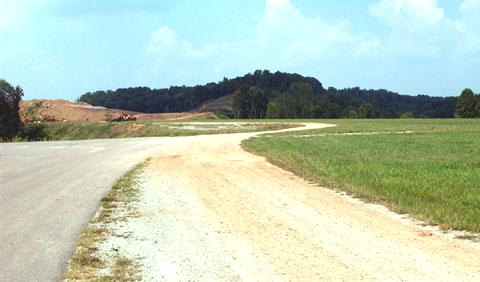REMOTE POSSIBILITY - Roane Rural Airfield

Roane County businessman Harry Boggs stands next to the Blue Lady, the last civilian 1941 Stinson Reliant ever produced. Boggs refurbished this "Cadillac of airplanes," which previously belonged to both Canadian missionaries and Mexican smugglers
Photo by M.K. McFarland
Remote possibility Roane business interests seek to end Spencer's splendid isolation with purchase and refurbishment of rural airfield
Sunday September 15, 2002
By Scott Finn
The hills that make Spencer so beautiful also make it almost impossible to drive to.
From Charleston, a driver can either exit I-79 at Clendenin and take U.S. 119 north, or take I-77 to Ripley and drive U.S. 33 east. Both two- lane roads follow old wagon paths from the 1800s.
Either way, a driver can expect hairpin curves and maximum speeds of 40 miles per hour, in good weather, if not stuck behind a truck.
The railroad left Roane County in the 1960s. There's no river large enough for boat traffic.
The county took a couple of hard hits recently. The closures of Kellwood clothing and Goodrich's aircraft evacuation slide plant cost more than 500 jobs.
County officials want to fill a 50,000-square-foot shell building and the 200,000-square-foot Kellwood facility. The lack of good transportation has hurt Roane County's efforts to find new employers.
"We are transportation deprived," said Mark Whitley, executive director of the Roane County Economic Development Authority. "Our biggest hurdle is transportation."

Harry Boggs and his son, George (left), both operate the airport, which is family-owned
Photo by M.K. McFarland
County officials are trying to convince Sen. Robert Byrd, D- W.Va., and other politicians to support a project to improve U.S. 33 from Spencer to I-77. In the meantime, they have another idea for getting around all those hills â flying above them.
The Roane County Airport Authority wants to buy a privately- owned airstrip outside of Spencer and turn it into a first-class small airport, complete with a paved runway and lights.
It asked for $5 million from the state Economic Development Grant Committee to buy Boggs Field, but the committee turned down the request.
Still, county officials aren't giving up. Earlier this month they received $100,000 in federal funds to conduct a study on the viability of buying the airstrip.
Harry Boggs, a self-made oil and gas businessman, built the 3,000-foot airstrip in 1997 because the county's existing field was too small. He did it with his own money, with no help from government sources.
Boggs loves flying. His parents didn't know he was taking flying lessons when he was a teen-ager.
In the mid-1980s, an accident almost ended his flying career but instead led to a new hobby.
Shortly after takeoff, Boggs had problems with the carburetor of his plane. He quickly circled around and had almost touched down when his left wing engine stalled and smashed into the asphalt.
The accident sent Boggs to the hospital and tore up the plane's wing, tail and fuselage. After he recovered, Boggs began rebuilding the plane. Since then, he's refurbished several more.
"It's a labor of love," said his son, George Boggs, who also flies and is involved in the development of the airport.

Part of a hill is being leveled to extend Boggs Field from 3,000 to 4,800 feet
Photo by M.K. McFarland
The Boggses are expanding the airport runway by 1,800 feet, to more than 4,800. To put that into perspective, Yeager's main runway is 6,300 feet.
Others besides the Boggs family use the airport, but it isn't a money-making venture, George Boggs said.
The current grass runway is fine for current users, but if the county owned the airport, it could apply for federal money to pave the runway and make other improvements, he said.
He is working with a professor from Yale University to build an environmentally-friendly industrial park on 26 acres of the airport, perhaps the state's first.
Harry Boggs approves of the plans, as long as his airport remains open to flyers. But if the county never buys the airport, he says he won't be heartbroken.
"It doesn't matter to me one way or the other," he said.